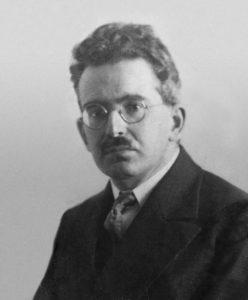Exploring the writings and tragic life of Walter Benjamin, the imperfect genius of the Freudian-Marxist philosophers of the Frankfurt School…

© Fabricio de Paula – Flickr Attribution 2.0 Generic (CC BY 2.0)
https://creativecommons.org/licenses/by/2.0/
Transformation will once again emerge from what is enslaved and downtrodden – but the class that today endures this enslavement is the class of the literati.” In these early musings, written when he was just 20 years old, Walter Benjamin (1892–1940) posited that intellectuals would be the revolutionaries of his time. Later Benjamin would go on to become arguably the foremost thinker of the Frankfurt School. He was a philosopher, art critic and essayist – and the “imperfect genius” of the Freudian-Marxist collection of philosophers who centered around Max Horkheimer. After an academic career eluded him, Benjamin scraped out a precarious existence as a freelance writer – this despite the fact that Theodor W. Adorno, eleven years his junior and himself regarded as one of the unworldly prodigies of the Frankfurt School, tended to Benjamin almost like a father. As Adorno would later describe Benjamin: “I have never encountered another person whose entire existence, including his outward appearance, was so profoundly characterized by an intellectual spirit.” Despite the esteem in which he was held, Benjamin would remain a kind of “problem child” who was only loosely associated with Horkheimer’s Institute for Social Research. This also left Benjamin largely outside the largesse bestowed upon the inner circle by the Institute’s endowment fund. Benjamin’s years of exile in Paris, where he had fled in 1933, were particularly marked by dire poverty – and of course the fear that he would be captured by the Nazis.
The storm of history
In 1940, Benjamin left for Spain, hoping to continue onward to Portugal and then escape to the United States, where many Jewish intellectuals had already sought refuge. Wracked with fear and despair, he committed suicide in the Spanish border town of Portbou. Had he succeeded in making his way to the US, Benjamin would likely have found life there more difficult than his exiled comrades. Benjamin spoke little English and his research interests were even more specialized than those of his colleagues. Benjamin was believed to have been carrying an important manuscript with him in the suitcase that was found with him after his death. This manuscript finally reappeared years later in the US, passed along by Hannah Arendt. The messianic “Theses on the Philosophy of History” still ranks as one of Benjamin’s most moving and thought-provoking works.
The “Theses on the Philosophy of History” begins with the description of a painting that Benjamin had acquired in 1921: “There is a painting by Paul Klee called Angelus Novus. It depicts an angel who looks as though he were about to move away from something he is staring at. His eyes are open wide, his mouth is open, and his wings are outstretched.” The angel’s gaze is directed towards Paradise, from which a storm is blowing that is pushing the angel away. It is the storm of history, which is heavy with catastrophe – a history whose path and future the angel cannot know or control – signaling a conception of history that represents a marked break with the intellectual traditions of both Marxism and the Enlightenment.

© Public Domain Wikimedia
Akademie der Künste, Walter Benjamin Archiv
The vision that opens Benjamin’s essay is an expression of the despair and resignation that had overcome the Frankfurt School after Nazi Germany made its initial conquests. But Benjamin, who had already spent three months in a French internment camp after the war broke out in 1939, was the one who had most directly experienced its impact.
In his highly lauded new biography of Walter Benjamin, Lorenz Jäger, who has for many years been editor at the culture desk of the daily newspaper Frankfurter Allgemeine Zeitung, deftly and knowledgably describes how Benjamin’s personal and intellectual worlds – as might be expected from a “literatus” – were intertwined. Benjamin, it seems, was always more a man of letters than an academic at heart.
Like a true artist, the paths that Benjamin followed during his life were always strongly influenced and inspired by his personal encounters. People who fascinated him often opened up new horizons of thought. This was the case with the educational reformer Gustav Wyneken (who, however, would later fall into disrepute due to pedophilia) and for Gershom Scholem, who awakened Benjamin’s interest in Kabbalah, Jewish myth and Jewish messianism. The same applied to the women Benjamin loved. “I have met three different women in my life and three different men within me,” Benjamin would comment in 1939. The first of these three women was Luise von Landau, who awakened Benjamin’s interest in the idea of nobility; the second the Russian revolutionary Asja Lacis, who “electrified” Benjamin with her communism; the third was the Parisian courtesan Hélène Léger, who Benjamin venerated as a “sexual commodity.” Other important women in Benjamin’s life would certainly have included his fiancée Grete Radt as well as Dora Kellner, his wife of many years.
Benjamin had a tendency to overinflate the personal dimension and to attribute world-historical significance to the twists and turns of his own biography. This is also true of his political intentions. As was true for Adorno, some of the figures of thought that Benjamin identified as dialectic were more properly a paradox. In this new biography, as well, there are repeated discussions about whether Benjamin’s dedication to revolution was more a matter of verbal radicalism than real conviction. Indeed, Benjamin’s activist impulses remained always within the mode of language.
Literati and prostitutes
However, Lorenz Jäger decisively refutes the claim that Benjamin’s political engagement might have been less than serious in its intent. In Jäger’s words: “The intellectual engages on a political level by working with concepts and transforming them. How else is an intellectual to work?”
Throughout his life, Benjamin remained fascinated by the topic of prostitution. From his book Berlin Childhood Around 1900 to the essay “On Some Motifs in Baudelaire,” Benjamin continued to draw parallels between prostitutes and the fate of the “literati,” whom by 1912 he had elevated to the true revolutionaries. As Benjamin wrote in an essay dedicated to Karl Kraus: “It is, fundamentally, on the complete agreement of two forms of existence – life under the aegis of mere mind, and life under the aegis of mere sexuality – that the solidarity of the man of letters with the whore is founded, a solidarity to which Baudelaire’s existence is the most inviolable testimony.” (Walter Benjamin: Selected Writings, Vol. 2, Part 2, Ed. Michael W. Jennings et al, 1999) Both forms of street existence – the whore and the urban man of letters – were compelled to commodify themselves, body and soul, to survive.
Many of Benjamin’s insights are still valuable today. Perhaps his work continues to exert such fascination because, like the romantic theory of the fragment, it remained unfinished, and thus its concepts could remain unfixed. After all, it was Benjamin who said the finished work is the “death mask of its conception.” Nonetheless, the Frankfurt-based literary critic Martin Lüdke warns against the urge to over-interpret Benjamin’s unfinished life and work. In his early academic years, Benjamin did indeed explore the idea of producing a systematic work. According to Lüdke, “The fragmentary character of [Benjamin’s] later work certainly also had something to do with his precarious circumstances after the failure of his academic career.”
Ultimately, however, Walter Benjamin’s life was a tragic one. We should therefore be all the more grateful for the “brief redemptions” that Benjamin’s writings grant to us.
Lorenz Jäger: Walter Benjamin: Das Leben eines Unvollendeten. Rowohlt Berlin, EUR 26.95, 395 pages
